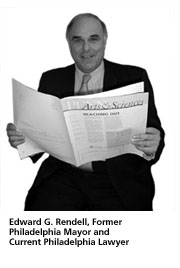
Philadelphia Lawyer
Former Mayor Makes the Case for
a Hometown Legend
In the case that established the right of a free press in America, observers noted that it took a Philadelphia lawyer to acquit John Peter Zenger, the New York printer sued for criminal libel in 1735. The term was first recorded in a London publication in 1788, which alluded to a proverbial saying: "It would puzzle a Philadelphia lawyer." Folklore has it that there was a New England adage that went, "Any three Philadelphia lawyers are a match for the devil." The term, it seems, is not without its dark side.
 For
eight years (1992-2000), Philadelphia's "first" Philadelphia
lawyer was the Honorable Ed Rendell, C'65, Hon'00. He also prosecuted
criminals for two terms as a Philadelphia district attorney. Currently,
he is in private practice with the Philadelphia law firm Ballard Spahr
Andrews & Ingersoll.
For
eight years (1992-2000), Philadelphia's "first" Philadelphia
lawyer was the Honorable Ed Rendell, C'65, Hon'00. He also prosecuted
criminals for two terms as a Philadelphia district attorney. Currently,
he is in private practice with the Philadelphia law firm Ballard Spahr
Andrews & Ingersoll.
In April, Rendell received the 2001 School of Arts and Sciences Distinguished Alumni Award. Who better, we thought, to offer some perspective on this legendary figure? On Monday evenings during the spring semester, the former mayor taught two urban studies courses in SAS: Can Cities Survive? and Who Gets Elected and Why. In the hour between classes, we buttonholed the likely Pennsylvania gubernatorial candidate and current Philadelphia lawyer, intruding with a few questions on the torrent of calls that came across his cell phone.
Q. How would you define the Philadelphia lawyer?
A. I don't think there is one definition. When that term was coined,
I think it had a positive meaning: a very sharp, with-it attorney who
knew a lot of the answers. It was a term of respect. If you try to categorize
the Philadelphia lawyer today, it's impossible.
Q. When you hear people talk about it, do they speak of the
Philadelphia lawyer in a flattering way or as an insult?
A. It depends. If you hear other lawyers talk about it, it's flattering:
a lawyer who is very astute, very knowledgeable. When you hear the public
talk about the Philadelphia lawyer, it's sort of an insult: a clever lawyer
who knows all the angles.
Q. While you were chair of the Democratic National Committee, three
Philadelphia lawyers went to Florida to contest the presidential election.
A. Yes. Steve Sheller, Mark Aronchik, and Bruce Ludwig. They won
some of the cases they put forward but lost the battle. I was proud of
what they did. They handled themselves well--they were creative and came
up with some unique and impressive arguments and were dogged in their
determination.
Q. Can you say what's "Philadelphia" about the Philadelphia
lawyer?
A. I think Philadelphia lawyers tend to be competitive and combative,
very much like the spirit of the town. There's a feistiness here. It's
a town that tends to get its juices flowing. We're not New York and we're
not Washington, so I think we're forced to fight a little harder to get
what we want. And we get it more often than not.
 If I were
to say one negative thing, I'd have to say that over the course of time
a lot of the courtesy in legal practice has been lost. For a number of
attorneys, the combativeness and the competitiveness has taken over. You
can be skillful and tough as nails, and still have respect for your opponent.
I'd really like to see the re-establishment of civility in the practice
of law.
If I were
to say one negative thing, I'd have to say that over the course of time
a lot of the courtesy in legal practice has been lost. For a number of
attorneys, the combativeness and the competitiveness has taken over. You
can be skillful and tough as nails, and still have respect for your opponent.
I'd really like to see the re-establishment of civility in the practice
of law.
I'll tell you a cute story. My son, Jesse, C'02, when he was about 12
or 13, went down to the shore with my wife, Midge, CW'69. I had my typical
mayoral duties, where I had about six places to go on a Saturday night.
When I knew I wouldn't be down, I'd call them about 11 o'clock. I said
to Jesse, "What did you do tonight?"
He said, "We went to see Jurassic Park."
"That's great, did you like it?"
"Yeah, the special effects were great. But, Dad, I didn't understand
one thing."
I said, "What's that?"
He said, "There was a scene where the dinosaur ate this lawyer who
was sitting on the can, and when the dinosaur ate the lawyer, everyone
applauded."
I know it's fashionable to dump on lawyers, and there are some in Philadelphia
who have violated their trust and their responsibility to the court. But,
by and large, I think we have a terrific bar. If there's a common strain
among our lawyers, I'd say it's a willingness, more so than in other cities,
to do pro bono work and to give back. If any of my political opponents
want to call me a Philadelphia lawyer, I'd take it as a compliment.